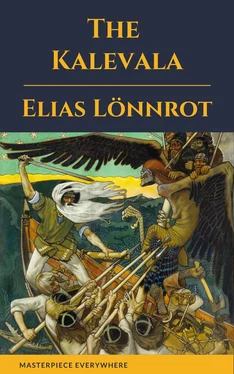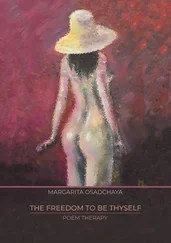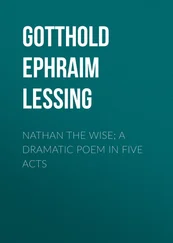This one hither, that one thither,
Stamp him in the mire and bedding,
In the rubbish of the stable."
Angry then grew Wainamoinen,
Wrathful waxed, and fiercely frowning,
Self-composed he broke his silence,
And began his wondrous singing.
Sang he not the tales of childhood,
Children's nonsense, wit of women,
Sang he rather bearded heroes,
That the children never heard of,
That the boys and maidens knew not
Known but half by bride and bridegroom,
Known in part by many heroes,
In these mournful days of evil,
Evil times our race befallen.
Grandly sang wise Wainamoinen,
Till the copper-bearing mountains,
And the flinty rocks and ledges
Heard his magic tones and trembled;
Mountain cliffs were torn to pieces,
All the ocean heaved and tumbled;
And the distant hills re-echoed.
Lo! the boastful Youkahainen
Is transfixed in silent wonder,
And his sledge with golden trimmings
Floats like brushwood on the billows;
Sings his braces into reed-grass,
Sings his reins to twigs of willow,
And to shrubs his golden cross-bench.
Lo! his birch-whip, pearl-enameled,
Floats a reed upon the border;
Lo! his steed with golden forehead,
Stands a statue on the waters;
Hames and traces are as fir-boughs,
And his collar, straw and sea-grass.
Still the minstrel sings enchantment,
Sings his sword with golden handle,
Sings it into gleam of lightning,
Hangs it in the sky above him;
Sings his cross-bow, gaily painted,
To a rainbow o'er the ocean;
Sings his quick and feathered arrows
Into hawks and screaming eagles;
Sings his dog with bended muzzle,
Into block of stone beside him;
Sings his cap from off his forehead,
Sings it into wreaths of vapor;
From his hands he sings his gauntlets
Into rushes on the waters;
Sings his vesture, purple-colored,
Into white clouds in the heavens;
Sings his girdle, set with jewels,
Into twinkling stars around him;
And alas! for Youkahainen,
Sings him into deeps of quick-sand;
Ever deeper, deeper, deeper,
In his torture, sinks the wizard,
To his belt in mud and water.
Now it was that Youkahainen
Comprehended but too clearly
What his folly, what the end was,
Of the journey he had ventured,
Vainly he had undertaken
For the glory of a contest
With the grand, old Wainamoinen.
When at last young Youkahainen,
Pohyola's old and sorry stripling,
Strives his best to move his right foot,
But alas! the foot obeys not;
When he strives to move his left foot,
Lo! he finds it turned to flint-stone.
Thereupon sad Youkahainen,
In the deeps of desperation,
And in earnest supplication,
Thus addresses Wainamoinen:
"O thou wise and worthy minstrel,
Thou the only true, magician,
Cease I pray thee thine enchantment,.
Only turn away thy magic,
Let me leave this slough of horror,
Loose me from this stony prison,
Free me from this killing torment,
I will pay a golden ransom."
Spake the ancient Wainamoinen:
"What the ransom thou wilt give me
If I cease from mine enchantment,
If I turn away my magic,
Lift thee from thy slough of horror,
Loose thee from thy stony prison,
Free thee from thy killing torment?"
Answered youthful Youkahainen:
"Have at home two magic cross-bows,
Pair of bows of wondrous power,
One so light a child can bend it,
Only strength can bend the other,
Take of these the one that pleases."
Then the ancient Wainamoinen:
"Do not wish thy magic cross-bows,
Have a few of such already,
Thine to me are worse than useless
I have bows in great abundance,
Bows on every nail and rafter,
Bows that laugh at all the hunters,
Bows that go themselves a-hunting."
Then the ancient Wainamoinen
Sang alas! poor Youkahainen
Deeper into mud and water,
Deeper in the slough of torment.
Youkahainen thus made answer:
"Have at home two magic shallops,
Beautiful the boats and wondrous;
One rides light upon the ocean,
One is made for heavy burdens;
Take of these the one that pleases."
Spake the ancient Wainamoinen:
"Do not wish thy magic shallops,
Have enough of such already;
All my bays are full of shallops,
All my shores are lined with shallops,
Some before the winds are sailors,
Some were built to sail against them."
Still the Wainola bard and minstrel
Sings again poor Youkahainen
Deeper, deeper into torment,
Into quicksand to his girdle,
Till the Lapland bard in anguish
Speaks again to Wainamoinen:
"Have at home two magic stallions,
One a racer, fleet as lightning,
One was born for heavy burdens;
Take of these the one that pleases."
Spake the ancient Wainamoinen:
"Neither do I wish thy stallions,
Do not need thy hawk-limbed stallions,
Have enough of these already;
Magic stallions swarm my stables,
Eating corn at every manger,
Broad of back to hold the water,
Water on each croup in lakelets."
Still the bard of Kalevala
Sings the hapless Lapland minstrel
Deeper, deeper into torment,
To his shoulders into water.
Spake again young Youkahainen:
"O thou ancient Wainamoinen,
Thou the only true magician,
Cease I pray thee thine enchantment,
Only turn away thy magic,
I will give thee gold abundant,
Countless stores of shining silver;
From the wars my father brought it,
Brought it from the hard-fought battles."
Spake the wise, old Wainamoinen:
"For thy gold I have no longing,
Neither do I wish thy silver,
Have enough of each already;
Gold abundant fills my chambers,
On each nail hang bags of silver,
Gold that glitters in the sunshine,
Silver shining in the moonlight."
Sank the braggart, Youkahainen,
Deeper in his slough of torment,
To his chin in mud and water,
Ever praying, thus beseeching:
"O thou ancient Wainamoinen,
Greatest of the old magicians,
Lift me from this pit of horror,
From this prison-house of torture;
I will give thee all my corn-fields,
Give thee all my corn in garners,
Thus my hapless life to ransom,
Thus to gain eternal freedom."
Wainamoinen thus made answer:
"Take thy corn to other markets,
Give thy garners to the needy;
I have corn in great abundance,
Fields have I in every quarter,
Corn in all my fields is growing;
One's own fields are always richer,
One's own grain is much the sweeter."
Lapland's young and reckless minstrel,
Sorrow-laden, thus enchanted,
Deeper sinks in mud and water,
Fear-enchained and full of anguish,
In the mire, his beard bedrabbled,
Mouth once boastful filled with sea-weed,
In the grass his teeth entangled,
Youkahainen thus beseeches:
"O thou ancient Wainamoinen,
Wisest of the wisdom-singers,
Cease at last thine incantations,
Only turn away thy magic,
And my former life restore me,
Lift me from this stifling torment,
Free mine eyes from sand and water,
I will give thee sister, Aino,
Fairest daughter of my mother,
Bride of thine to be forever,
Bride of thine to do thy pleasure,
Sweep the rooms within thy cottage,
Keep thy dwelling-place in order,
Rinse for thee the golden platters,
Spread thy couch with finest linens,
For thy bed, weave golden covers,
Bake for thee the honey-biscuit."
Читать дальше












